Memoirs & Diaries - When Tank Fought Tank
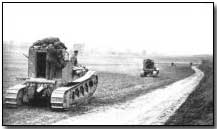 On April 23rd, 1918, three
tanks covered with their green camouflage nets were lying hidden in the
gas-drenched wood of Bois-l'Abbe, near Villers-Bretonneux, awaiting the
impending German attack.
On April 23rd, 1918, three
tanks covered with their green camouflage nets were lying hidden in the
gas-drenched wood of Bois-l'Abbe, near Villers-Bretonneux, awaiting the
impending German attack.
The crews had worn masks for the greater part of the day and their eyes were sore, their throats dry.
Darkness came, but with it two enemy planes flying low, over the tree tops. They dropped Verey lights that fell right in our midst, showing up the bulky outlines of the tanks in vivid relief. We were discovered!
An hour later, when clouds hid the moon, three huge, toad-like forms, grunting and snorting, crept out of the wood to a spot some hundred yards to the rear.
Just before dawn on April 24th a tremendous bombardment deluged the wood; I was aroused in the dark by someone shaking me violently. "Gas, sir, gas!"
I struggled up, half awake, inhaled a foul odour and quickly slipped on my mask. My eyes were running, I could not see, my breath came with difficulty. I could hear the trees crashing to the ground near me.
For a moment I was stricken with panic, then, suddenly, a thought sped through my confused mind, "If you are going to die, why not die decently?" I listened to that inner voice and pulled myself together, only to discover that I had omitted to attach my nose clip!
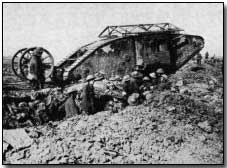 Holding
hands with my section commander and the orderly who had aroused us, we
groped our way to the open.
Holding
hands with my section commander and the orderly who had aroused us, we
groped our way to the open.
It was pitch dark, save where, away on the edge of the wood, the rising sun showed blood red.
As we stumbled forward, tree trunks, unseen in that infernal gloom, separated our joined hands and we were tripped up by bushes and brambles. Suddenly a hoarse cry came from the orderly, "My mouthpiece is broken, sir!" "Run like hell for the open!" shouted the section commander. There was a gasp, and then we heard him crashing away through the undergrowth like a hunted beast.
Soon I found my tank covered with its tarpaulin. The small oblong doors were open, but the interior was empty. On the ground, in the wrappings of the tarpaulin, however, I felt something warm and fleshy. It was one of the crew lying full length, wearing his mask, but dazed by gas.
Behind the trenches a battery of artillery was blazing away, the gunners in their gas masks feverishly loading and unloading like creatures of a nightmare. Meanwhile, as the shelling grew in intensity, a few wounded men and some stragglers came into sight. Their report was depressing, Villers-Bretonneux had been captured and with it many of our own men. The Boche had almost broken through.
By this time two of my crew had developed nasty gas symptoms, spitting, coughing, and getting purple in the face. They were led away to the rear, one sprawling limply in a wheelbarrow found in the wood.
We waited till an infantry brigadier appeared on the scene with two orderlies. He was unaware of the exact position ahead and, accompanied by our section captain and the runners, he went forward to investigate.
In ten minutes one of the runners came back, limping badly, hit in the leg. In another ten minutes the second returned, his left arm torn by shrapnel, then, twenty minutes after that, walking, unhurt and serene, through the barrage came the brigadier and our captain.
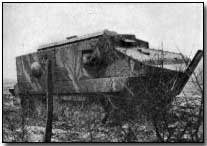 The
news was grave. We had suffered heavy losses and lost ground, but some
infantry were still holding out in the switch-line between Cachy and
Villers-Bretonneux.
The
news was grave. We had suffered heavy losses and lost ground, but some
infantry were still holding out in the switch-line between Cachy and
Villers-Bretonneux.
If this line were overwhelmed the Boche would obtain possession of the high ground dominating Amiens and would, perhaps, force us to evacuate that city and drive a wedge between the French and British armies.
A serious consultation was held and the order came, "Proceed to the Cachy switch-line and hold it at all costs."
We put on our masks once more and plunged, like divers, into the gas-laden wood. As we strove to crank up, one of the three men, turning the huge handle, collapsed. We put him against a tree, gave him some tablets of ammonia to sniff, and then, as he did not seem to be coming round, we left him, for time was pressing.
Out of a crew of seven, four men, with red-rimmed, bulging eyes, only remained.
The three tanks, one male, armed with two six-pounder guns and machine guns, and two females, armed with machine guns only, crawled out of the wood and set off over the open ground towards Cachy.
Ahead, the German barrage stood like a wall of fire in our path. There was no break in it anywhere. It seemed impossible that we could pass through that deadly area unhit. I decided to attempt a zigzag course, as somehow it seemed safer.
Luck was with us; going at top speed, we went safely through the danger zone and soon reached the Cachy lines, but there was no sign of our infantry.
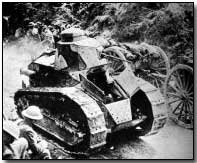 Suddenly,
out of the ground 10 yards away, an infantryman rose, waving his rifle
furiously.
Suddenly,
out of the ground 10 yards away, an infantryman rose, waving his rifle
furiously.
We stopped. He ran forward and shouted through the flap, "Look out! Jerry tanks about!" and then as swiftly disappeared into the trench again.
I informed the crew, and a great thrill ran through us all. Opening the loophole, I looked out. There, some 300 yards away, a round, squat-looking monster was advancing. Behind it came waves of infantry and further away to left and right crawled two more of these armed tortoises.
So we had met our rivals at last! For the first time in history tank was encountering tank!
The 6-pounder gunners crouching on the floor, their backs against the engine cover, loaded their guns expectantly. We still kept on a zigzag course, threading the gaps between the lines of hastily dug trenches, and coming near the small protecting belt of wire, we turned left and the right gunner, peering through his narrow slit, made a sighting shot.
The shell burst some distance beyond the leading enemy tank. No reply came. A second shot boomed out, landing just to the right, but again no reply.
Suddenly, against our steel wall, a hurricane of hail pattered, and the interior was filled with myriads of sparks and flying splinters. Something rattled against the steel helmet of the driver sitting next to me and my face was stung with minute fragments of steel.
The crew flung themselves flat on the floor. The driver ducked his head and drove straight on. Above the roar of our engine could be heard the staccato rat-tat-tat-tat of machine guns and another furious jet of bullets sprayed our steel side, the splinters clanging viciously against the engine cover.
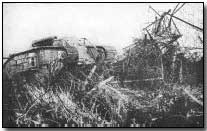 The
Jerry tank had treated us to a broadside of armour-piercing bullets!
The
Jerry tank had treated us to a broadside of armour-piercing bullets!
Taking advantage of a dip in the ground, we got beyond range and then turning, we manoeuvred to get the left gunner on to the moving target. Owing to our gas casualties the gunner was working single-handed and his right eye being too swollen with gas he aimed with the left.
In addition, as the ground was heavily scarred with shell holes we kept going up and down like a ship in a heavy sea, making accurate shooting difficult. His first shot fell some 30 yards in front and the next went beyond.
Nearing the village of Cachy, I saw to my astonishment that the two female tanks were slowly limping away to the rear. They had both been hit by shells almost immediately on their arrival and had great holes in their sides. As their Lewis guns were useless against the heavy armour-plate of the enemy and their gaping sides no longer afforded them any defence against machine-gun bullets, they had nothing to do but withdraw from action.
We still were lucky enough to dodge the enemy shelling, although the twisting and turning once or twice almost brought us on top of our own trenches.
Whilst we were ranging on the leading German tank, our own infantry were standing in their trenches watching the duel with tense interest, like spectators in the pit of a theatre.
Looking down on one occasion I saw to my horror that we were going straight down into a trench full of men who, huddled together, were yelling at the tops of their voices to attract our attention.
A quick signal to the gears-man seated in the rear of the tank and we turned swiftly, avoiding catastrophe by a second.
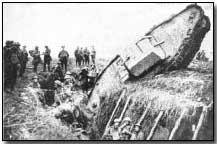 Another
raking broadside of armour-piercing bullets gave us our first casualty, a
bullet passing through the fleshy part of both legs of the Lewis gunner at
the rear after piercing the side of the tank!
Another
raking broadside of armour-piercing bullets gave us our first casualty, a
bullet passing through the fleshy part of both legs of the Lewis gunner at
the rear after piercing the side of the tank!
We had no time to put on more than a temporary dressing and he lay on the floor, bleeding and groaning, whilst the 6-pounder boomed over his head and the empty shell cases clattered all round him.
The roar of our engine, the nerve-racking rat-tat-tat of our machine guns blazing at the Boche infantry, and the thunderous boom of the 6-pounders, all bottled up in that narrow space, filled our ears with tumult. Added to this we were half-stifled by the fumes of petrol and cordite.
Again we turned and proceeded at a slower pace; the left gunner, registering carefully, hit the ground right in front of the Jerry tank. I took a risk and stopped the tank for a moment.
The pause was justified; a carefully aimed shot hit the turret of the German tank, bringing it to a standstill. Another roar and yet another white puff at the front of the tank denoted a second hit! Peering with swollen eyes through his narrow slit the elated gunner shouted words of triumph that were drowned by the roaring of the engine.
Then once more with great deliberation he aimed and hit for the third time. Through a loophole I saw the tank heel over to one side and then a door opened and out ran the crew. We had knocked the monster out!
Quickly I signed to the machine-gunner, and he poured volley after volley into the retreating figures. My nearest enemy being now out of action, I turned to look at the other two, who were coming forward slowly.
As the German infantry were still advancing, the 6-pounder gunner sent round after round of case shot in their direction which, scattering like the charge of a shot gun, spread havoc in their ranks.
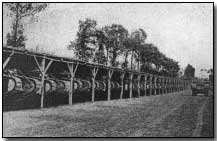 Now,
I thought, we shall not last very long. The two great tanks were
creeping forward relentlessly; if they both concentrated their fire on us at
once we would be finished.
Now,
I thought, we shall not last very long. The two great tanks were
creeping forward relentlessly; if they both concentrated their fire on us at
once we would be finished.
We sprinkled the neighbourhood of one of them with a few sighting shells, when to my intense joy and amazement, I saw it go slowly backwards. Its companion did likewise and in a few minutes they both had disappeared from sight, leaving our tank the sole possessor of the field.
This situation, however gratifying, soon displayed numerous disadvantages. We were now the only thing above ground and naturally the German artillery made savage efforts to wipe us off the map.
Up and down we went, followed by a trail of bursting shells. I was afraid that at any minute a shell would penetrate the roof and set the petrol alight, making the tank a roaring furnace before we could escape.
Then I saw an aeroplane flying overhead not more than a hundred feet up. A great black cross was on each underwing and as it crossed over us I could see clearly the figures of the pilot and observer, when something round and black dropped from it.
I watched it for a fraction of a second, horrified! The front of the tank suddenly bounded up into the air and the tank seemed to stand on end. Everything shook, rattled, and jarred. We fell back to earth with a crash and then continued on our journey unhurt.
Our steel walls had held nobly, but how much more would they endure?
A few minutes later, as we were turning, the driver failed to notice that we were on the edge of a steep shell hole, and down we went with a crash, so suddenly that one of the gunners, taken unawares, fell forward on top of me.
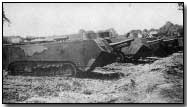 The
driver, in order to right the tank, jerked open the throttle to its fullest
extent. We snorted up the opposite lip of the crater at full speed,
but when just about to clamber over the edge the engine stopped. Our
nose was pointing heavenwards, a lovely stationary target for the Boche
artillery!
The
driver, in order to right the tank, jerked open the throttle to its fullest
extent. We snorted up the opposite lip of the crater at full speed,
but when just about to clamber over the edge the engine stopped. Our
nose was pointing heavenwards, a lovely stationary target for the Boche
artillery!
A deadly silence ensued...
After the intolerable racket of the past few hours it seemed to us uncanny. Now we could hear the whining of shells, and the vicious crump as they exploded near at hand.
Fear entered our hearts; we were inclined at such a steep angle that we found it impossible to crank up the engine again.
Every second we expected to get a shell through the top. Almost lying on their sides, the crew strained and heaved at the starting handle, but to no effect.
Our nerves were on edge; there was but one thing left, to put the tank in reverse gear, release the rear brake, and let it run backwards down the shell hole under its own weight. Back we slid and happily the engine began to splutter, then, carefully nursing the throttle, the driver changed gear and we climbed out unhurt. What sweet music was the roar of the engine in our ears now!
But the day was not yet over. As I peeped through my flap I noticed that the Boche infantry were forming up some distance away preparing for an attack. Then my heart bounded with joy, for away on the right I saw seven small whippets, the newest and fastest type of tank, racing into action.
They came on at ten to fifteen miles an hour, heading straight for the German infantry. I could see the latter scattering in all directions. The whippets plunged into the midst of them, ran over them, spitting fire into their retreating ranks.
Their work was soon over. They had nipped an attack in the bud, but only three, their tracks dripping with blood, came back out of the seven; the other four were left burning out there in front. Their crews could not hope to be made prisoners after such slaughter.
Then, near Villers-Bretonneux, about 1,000 yards away, appeared a fourth German tank. The left gunner opened fire immediately and a minute later the reply came swift and sharp, three shells hitting the ground alongside of us.
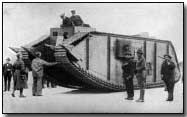 Pursuing
the same tactics, we increased our speed and then turned. We heard a
tremendous crack and the tank continued to turn round in a circle.
Pursuing
the same tactics, we increased our speed and then turned. We heard a
tremendous crack and the tank continued to turn round in a circle.
"What the hell are you doing?" I roared at the driver in exasperation. He looked at me in bewilderment and made another effort, but still we turned round and round. Peeping out, I saw one caterpillar track doubled high in the air!
We had been hit by the Boche artillery at last, two of the track plates being blown clear away! I decided to quit. The engine stopped.
Defiantly we blazed away our last few rounds at the slopes near Villers-Bretonneux and then crept gingerly out of the tank, the wounded man riding on the back of a comrade.
We made for the nearest trench, when "rat-tat-tat-tat" and the air became alive with bullets.
We flopped quickly to the ground, waiting breathlessly whilst the bullets threw up the dirt a few feet away. Then the shooting ceased and we got up again and ran swiftly forward.
By a miracle nothing touched us, and we reached the parapet of a trench. Our faces were black with grime and smoke and our eyes bloodshot. The astonished infantrymen gazed at us open-mouthed, as if we were apparitions from a ghostly land.
"Take your bayonets out of the way," we yelled, and tumbled down into the trench.
F. Mitchell enlisted September 1914. July 1915 to February 1917 A.O.C. attached 21St Division in France; March 1917 to end of War, Lieut. in Tank Corps; 1st Battalion.
March Retreat 1918, Villers-Bretonneux, April 1918, attack of August 8th (Battle of Amiens). M.C. gained for fighting enemy tanks at Villers-Bretonneux.
First published in Everyman at War (1930), edited by C. B. Purdom.
Photographs courtesy of Photos of the Great War website.
"Bully Beef" comprised cans of boiled or pickled beef used by the British Army.
- Did you know?
